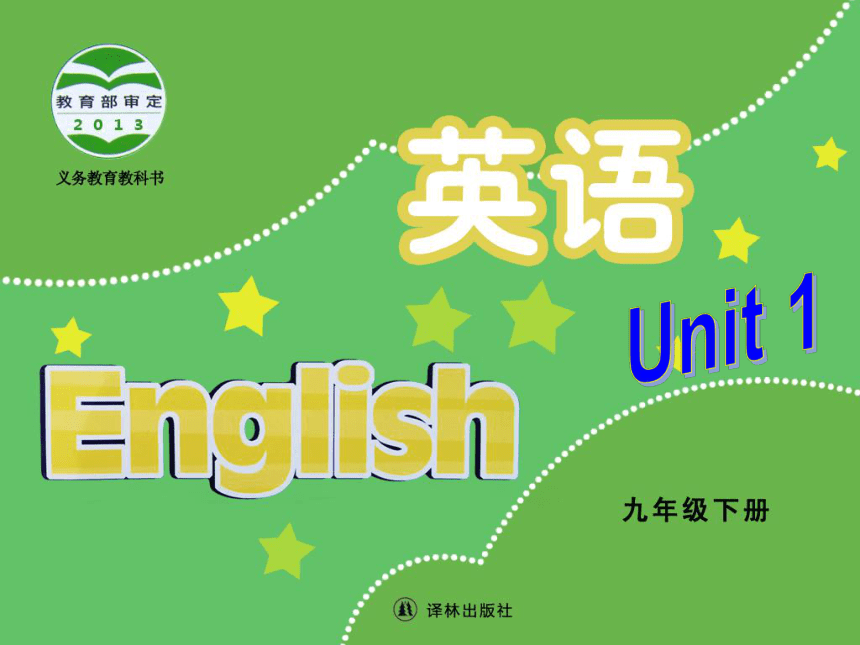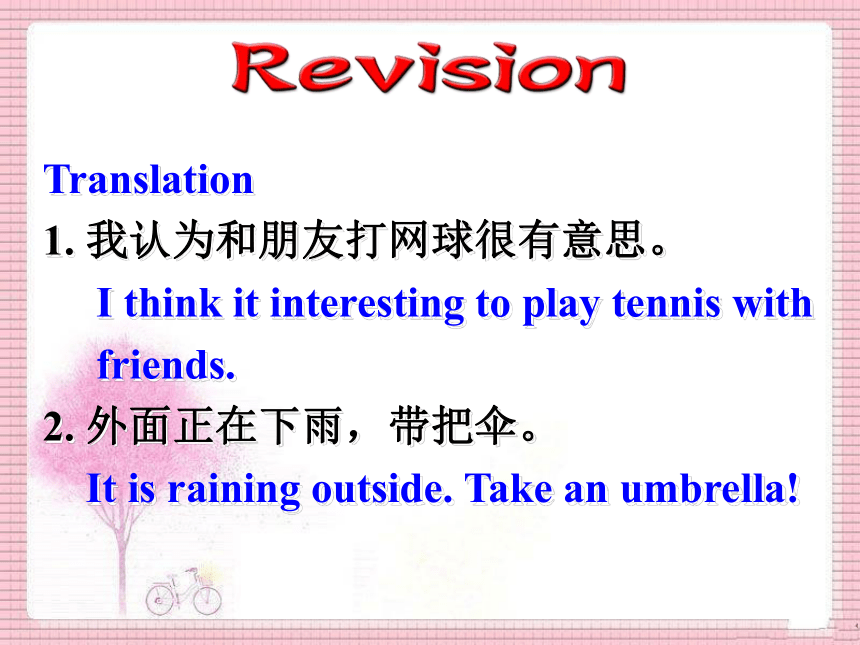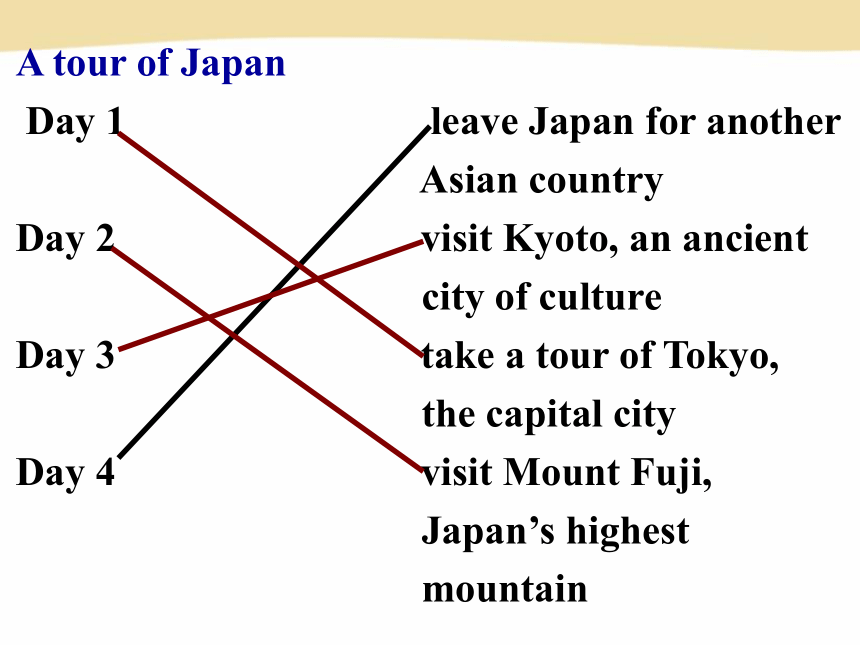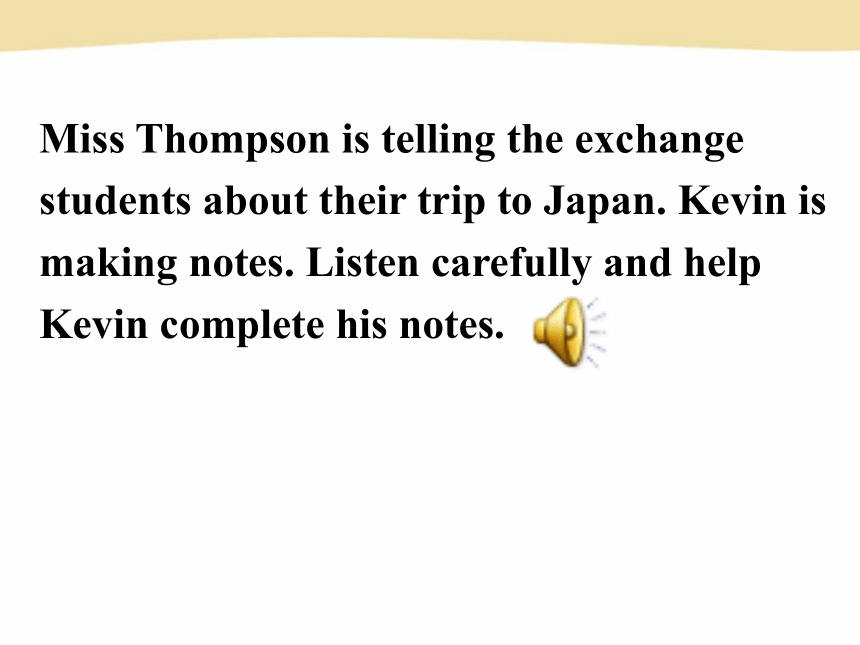新版译林牛津英语九年级下册Unit 1 Asia Integrated Skills(共32张PPT)
文档属性
| 名称 | 新版译林牛津英语九年级下册Unit 1 Asia Integrated Skills(共32张PPT) |  | |
| 格式 | zip | ||
| 文件大小 | 2.2MB | ||
| 资源类型 | 教案 | ||
| 版本资源 | 牛津译林版 | ||
| 科目 | 英语 | ||
| 更新时间 | 2016-02-15 10:02:48 | ||
图片预览












文档简介
课件32张PPT。Unit 1Unit 1 AsiaIntegrated skillsTranslation
1. 我认为和朋友打网球很有意思。
I think it interesting to play tennis with
friends.
2. 外面正在下雨,带把伞。
It is raining outside. Take an umbrella!3. 对学生来说,上课认真听讲非常重要。
It is very important for students to listen carefully in class.
4. 门铃响了,可能是你爸爸。
The door bell rings. It may be your father. Have you ever travelled abroad?
Which foreign country would you
like to visit?A trip to Japan 1. Have you ever been to Japan?
2. What would you like to see in Japan?
3. What would you like to eat in Japan?Pair workThe exchange students are going to Japan after visiting Shanghai. Listen to Millie introducing their itinerary. Match the days on the left with their activities on the right. A trip to JapanA tour of Japan
Day 1 leave Japan for another
Asian country
Day 2 visit Kyoto, an ancient
city of culture
Day 3 take a tour of Tokyo,
the capital city
Day 4 visit Mount Fuji,
Japan’s highest
mountainMiss Thompson is telling the exchange students about their trip to Japan. Kevin is making notes. Listen carefully and help Kevin complete his notes. ? leave Shanghai at __________________ on
________________
? arrive in _________ around ________
? see the main _______ and go ________
visit the Tokyo _______________ to see
some Japanese ________________
? travel to ___________ by ______ on the
second day; can go _______ there9:00 in the morning25th, FebruaryTokyonoonsitesshoppingNational Museumworks of artMount Fujicoachskiing? visit the ancient city Kyoto on the third
day and learn about Japanese __________
? try all kinds of Japanese _______ during
our stay in JapanculturefoodKevin is writing about the exchange students’ trip to Japan. Help him complete it. Use the information in Parts A1 and A2 to help you. We are leaving for Japan soon. Japan is the second country we are going to visit in Asia. Our flight will be (1) ________ on 25 February, and we plan to stay there for
(2) ______________.
First, we are going to visit (3) _______. It is Japan‘s capital city. We can see the main (4) ___________ and go (5) _________ there. Our teacher, Miss Thompson, is also going to take us to the (6) _____________________ to see some Japanese (7) _______________.The trip to Japanleaving four days Tokyo sites shoppingTokyo National Museum works of artOn the second day, we are going to take a (8) __________ to (9) ___________. It is Japan’s (10) ________ mountain. We can go (11) ___________ there.
On the third day, we are going to visit an ancient city called (12) ________ and learn about Japanese (13) ________.
During our stay in Japan, we can also try all kinds of Japanese (14) _______.
I hope we will have a very nice trip.coach Mount Fuji highest skiingKyotoculturefoodExplanation1. leave Japan for another Asian country
离开日本去另一个亚洲国家
leave sp. for sp. 离开(出发地)去(目
的地)
leave for sp. 离开去(目的地)
e.g. He left Shanghai for Beijing
yesterday. 他昨天离开上海去北京了。
He left for Beijing yesterday.
他昨天离开去北京了。2. take a tour of Tokyo
参观一下东京
e.g. Can I take a tour of your house?
我能参观一下你的房子吗?
3. during our stay in Japan
在我们在东京逗留期间
saty n. 停留,逗留(时间);做客
v. 保持;停留;待;逗留e.g. His aunt called and told him to extend
his stay for a few days.
姨姨打电话给他,让他在那里多待几
天。
Please give me a correct answer so that
I choose to leave or to stay.
请你给我一个正确答案好让我选择离
开还是留下。翻译句子:
1. 我父亲很快就要离开去法国了,我们会
想他的。
My father ______________ France
soon. We’ll miss him.
2. 他什么时候离开上海去美国的?
When did he
__________________________?
3. 我希望我们会有一次愉快的旅行。
I hope ____________________________.is leaving forleave Shanghai for Americawe will have a nice trip4. 让他留下和我们共进晚餐是不合适的。
It’s out of place to ask him
___________________________.
5. 我们在日本停留期间,遇到了很多著名
的歌手。
______________________, we met
many famous singers.During our stay in Japanto stay with us for dinner6. 第三天,我们的老师带我们去游览了富
士山。
_______________, our teacher
______________ Mount Fuji.On the third day
took us to visit1. Where is Singapore?
2. How many people are there in
Singapore?It’s in South East Asia.There are about five million people there. Listen and answer.3. What languages do they speak?Most people can speak both English and Chinese. Read Annie and Simon’s conversation on P16 first, then work in pairs and talk about an Asian country. Use their conversation as a model.A: Where is...?
B: It’s in ...
A: How many people are there in ...?
B: There are about ... people there.
A: What languages do they speak?
B: They speak ...1. It’s in South East Asia.
它位于东南亚。
South East Asia 东南亚
East Asia 东亚
South Asia 南亚 West Asia 西亚
North Asia 北亚 Central Asia中亚Explanation2. It’s very small, isn’t it? 它很小,不是
吗?
反义疑问句即附加疑问句。它表示提问
人的看法,没有把握,需要对方证实。
反义疑问句由两部分组成: 前一部分是一
个陈述句,后一部分是一个简短的疑问
句,两部分的人称时态应保持一致。
主要形式:
陈述部分肯定式+疑问部分否定式
陈述部分否定式+疑问部分肯定式 。e.g. He is a basketball , isn’t he?
He isn’t a basketball, is he?
They never talk about film stars, do they?
They often talk about film stars, don’t
they?
His father has been to Japan, hasn’t he?
His father has never been to Japan, has
he?Homework1. Remember the words and
expressions in this lesson.
2. Preview Speak up and Study skills.
1. 我认为和朋友打网球很有意思。
I think it interesting to play tennis with
friends.
2. 外面正在下雨,带把伞。
It is raining outside. Take an umbrella!3. 对学生来说,上课认真听讲非常重要。
It is very important for students to listen carefully in class.
4. 门铃响了,可能是你爸爸。
The door bell rings. It may be your father. Have you ever travelled abroad?
Which foreign country would you
like to visit?A trip to Japan 1. Have you ever been to Japan?
2. What would you like to see in Japan?
3. What would you like to eat in Japan?Pair workThe exchange students are going to Japan after visiting Shanghai. Listen to Millie introducing their itinerary. Match the days on the left with their activities on the right. A trip to JapanA tour of Japan
Day 1 leave Japan for another
Asian country
Day 2 visit Kyoto, an ancient
city of culture
Day 3 take a tour of Tokyo,
the capital city
Day 4 visit Mount Fuji,
Japan’s highest
mountainMiss Thompson is telling the exchange students about their trip to Japan. Kevin is making notes. Listen carefully and help Kevin complete his notes. ? leave Shanghai at __________________ on
________________
? arrive in _________ around ________
? see the main _______ and go ________
visit the Tokyo _______________ to see
some Japanese ________________
? travel to ___________ by ______ on the
second day; can go _______ there9:00 in the morning25th, FebruaryTokyonoonsitesshoppingNational Museumworks of artMount Fujicoachskiing? visit the ancient city Kyoto on the third
day and learn about Japanese __________
? try all kinds of Japanese _______ during
our stay in JapanculturefoodKevin is writing about the exchange students’ trip to Japan. Help him complete it. Use the information in Parts A1 and A2 to help you. We are leaving for Japan soon. Japan is the second country we are going to visit in Asia. Our flight will be (1) ________ on 25 February, and we plan to stay there for
(2) ______________.
First, we are going to visit (3) _______. It is Japan‘s capital city. We can see the main (4) ___________ and go (5) _________ there. Our teacher, Miss Thompson, is also going to take us to the (6) _____________________ to see some Japanese (7) _______________.The trip to Japanleaving four days Tokyo sites shoppingTokyo National Museum works of artOn the second day, we are going to take a (8) __________ to (9) ___________. It is Japan’s (10) ________ mountain. We can go (11) ___________ there.
On the third day, we are going to visit an ancient city called (12) ________ and learn about Japanese (13) ________.
During our stay in Japan, we can also try all kinds of Japanese (14) _______.
I hope we will have a very nice trip.coach Mount Fuji highest skiingKyotoculturefoodExplanation1. leave Japan for another Asian country
离开日本去另一个亚洲国家
leave sp. for sp. 离开(出发地)去(目
的地)
leave for sp. 离开去(目的地)
e.g. He left Shanghai for Beijing
yesterday. 他昨天离开上海去北京了。
He left for Beijing yesterday.
他昨天离开去北京了。2. take a tour of Tokyo
参观一下东京
e.g. Can I take a tour of your house?
我能参观一下你的房子吗?
3. during our stay in Japan
在我们在东京逗留期间
saty n. 停留,逗留(时间);做客
v. 保持;停留;待;逗留e.g. His aunt called and told him to extend
his stay for a few days.
姨姨打电话给他,让他在那里多待几
天。
Please give me a correct answer so that
I choose to leave or to stay.
请你给我一个正确答案好让我选择离
开还是留下。翻译句子:
1. 我父亲很快就要离开去法国了,我们会
想他的。
My father ______________ France
soon. We’ll miss him.
2. 他什么时候离开上海去美国的?
When did he
__________________________?
3. 我希望我们会有一次愉快的旅行。
I hope ____________________________.is leaving forleave Shanghai for Americawe will have a nice trip4. 让他留下和我们共进晚餐是不合适的。
It’s out of place to ask him
___________________________.
5. 我们在日本停留期间,遇到了很多著名
的歌手。
______________________, we met
many famous singers.During our stay in Japanto stay with us for dinner6. 第三天,我们的老师带我们去游览了富
士山。
_______________, our teacher
______________ Mount Fuji.On the third day
took us to visit1. Where is Singapore?
2. How many people are there in
Singapore?It’s in South East Asia.There are about five million people there. Listen and answer.3. What languages do they speak?Most people can speak both English and Chinese. Read Annie and Simon’s conversation on P16 first, then work in pairs and talk about an Asian country. Use their conversation as a model.A: Where is...?
B: It’s in ...
A: How many people are there in ...?
B: There are about ... people there.
A: What languages do they speak?
B: They speak ...1. It’s in South East Asia.
它位于东南亚。
South East Asia 东南亚
East Asia 东亚
South Asia 南亚 West Asia 西亚
North Asia 北亚 Central Asia中亚Explanation2. It’s very small, isn’t it? 它很小,不是
吗?
反义疑问句即附加疑问句。它表示提问
人的看法,没有把握,需要对方证实。
反义疑问句由两部分组成: 前一部分是一
个陈述句,后一部分是一个简短的疑问
句,两部分的人称时态应保持一致。
主要形式:
陈述部分肯定式+疑问部分否定式
陈述部分否定式+疑问部分肯定式 。e.g. He is a basketball , isn’t he?
He isn’t a basketball, is he?
They never talk about film stars, do they?
They often talk about film stars, don’t
they?
His father has been to Japan, hasn’t he?
His father has never been to Japan, has
he?Homework1. Remember the words and
expressions in this lesson.
2. Preview Speak up and Study skills.
